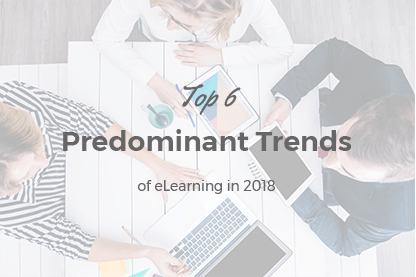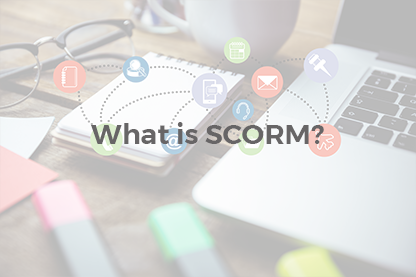The way adults and children learn differs radically, and “being too old to learn” is not the main point. You can use the same LMS software and even apply the principles of kids’ learning to teaching adults, but if you don’t know what makes an adult learner engaged, motivated and excited about your online course, the chances the training will fail are pretty high.
To help you to get an idea of adult learning, understand its main principles and learn how not to make mistakes when creating courses for adults, we’ve interviewed an experienced Instructional Designer and Technologist – Julian Davis.
The way adults and children learn differs radically, and “being too old to learn” is not the main point. You can use the same LMS software and even apply the principles of kids’ learning to teaching adults, but if you don’t know what makes an adult learner engaged, motivated and excited about your online course, the chances the training will fail are pretty high.
To help you to get an idea of adult learning, understand its main principles and learn how not to make mistakes when creating courses for adults, we’ve interviewed an experienced Instructional Designer and Technologist – Julian Davis.
To me, andragogy and pedagogy are very different in the way they are applied to learning. As children, we are told to go to school and learn. We are not told what we are learning, it just ‘happens’ based’ on our age and curriculum. However when it comes to adult learners, the learner must want to learn and have a reason for wanting to learn. Adult learners are much more self-directed than children and know what they want to learn. Forcing an adult learner into a course they don’t want to do will often result in the learner not retaining any information.
Adults learn very differently from younger learners. The best way to describe this is with an example. Let’s take an example of mathematical equation that calculates how much power is consumed by a light bulb over a period of a month. When this is applied to a Year 10 student, this is just part of their curriculum and they don’t think any different. This is just another day in the classroom for them and just something they have to learn as the teacher has told them.
Now let’s look at an adult learner. Does this mathematical equation have any bearing on their life? Most probably not. Is it relevant to what they do? Most likely not. The difference here is that for adult learners must have an interest and it must be relevant for them to want to learn something.
One of the adult learning theories is that something must be relevant to what the student is learning, as well as it being relevant to real life problems. When it comes to applying these in an eLearning environment, use real life scenarios or stories that the adult learner can relate to. Use video to explain something (if this is available) to support the scenario.
The best way for me to answer this is to provide a real life example. When I was teaching web development to adult learners, one of the subjects I had to deliver was Intellectual Property and Copyright. This can be a very tough subject to deliver due to the nature of the content. Understanding adult learning theories, I decided to have the class watch the movie ‘The Social Network’, the story about the beginning of Facebook and how the founders had a fall out of intellectual property rights. What I found was that the students became much more engaged and wanted to discuss the topic openly. Why did this work? Facebook is a tool of today that everyone uses so it was relevant to what the learners did in their everyday lives and they could relate to it. We were still able to cover all the copyright laws, all in the context of the Facebook Intellectual Property rights.
Technology plays a big part in today’s learning and how it is delivered via an LMS is equally as important. When dealing with adult learners and technology there are many things to consider. Based on these considerations, I’ve derived 5 points that Instructional Designers need to take into consideration when developing their courses for online delivery via an LMS:
1. Bias
How many times do we hear “Apple® is better than Android®” or “Microsoft® has the advantage over Apple®”? This can be extended to “when on the internet, use Chrome® as it won’t work on Internet Explorer®”. These are all too common these days, however this could affect the way an adult learner can access learning tools. Think about an adult learner that simply uses Microsoft Windows® and only uses the built in web browser (Internet Explorer®): How would this affect them? There are also adults that will only use Android® and will continue to bag out any other competitor and will not use any other brand; we all know someone like this! When Instructional Designers are designing courses, they should consider making their tools platform agnostic, that being they work across any platform and not discriminate. This is not as easy as it sounds, but from an adult learner’s perspective, it has to be considered.
2. Literacy
Ask yourself these questions:
- Can everyone conduct an internet search?
- Can everyone use different search engines and change the search term to refine their search?
These are assumptions that educators make. These are fairly good assumptions given the technology we all have access to these days. It’s all around us, so everyone knows it. Right? I’d have to disagree. I was once asked ‘Where does the CD go?’ when delivering an introduction course to tablets. You may laugh at how silly this may seem, but older adult learners find it hard to keep up with technology.
3. Experience and Exposure
The technology that adults are exposed to varies extensively, and can be very diverse. How much technology has an older adult learner been exposed to? When it comes to an adult learner starting to study again, perhaps after being out of the work force to raise a family, will they have the experience to just pick up an online course or resource and just slip straight into it? I’ll use an example and this time I’ll bring my mother into it. She’s in her early 70s and has had some exposure to technology, purely based on myself and my brother patiently taking her through various technologies over the past few years. She’s now on an iPad®, which is great, but ask her to download a PDF and she’ll throw you a look that included “A wha?”, all with an Irish twang. She may get emails with PDFs as attachments, but does she know what it is? Not being exposed to common technology today, that we may take for granted, can have an impact on adult learners.
4. Fear
There is a genuine fear of losing data, losing photos, breaking things, or losing all their personal details when it comes to technology, especially with adults. Adults that have not been exposed to technology would only hear the “scary stories” from the media or family where something has happened, be it hacked or scammed in some way. Relating this back to learning, if an adult learner has a real fear of technology, they most likely won’t be able to use any form of eLearning tool. Alerts and messages popping up and a lack of digital literacy can cause unwanted stress to an adult that already has a fear of technology. This could also lead to them giving up and becoming totally disengaged.
5. Social and Culture Exposure
Finally, there is the social and cultural exposure to technology. I don't wish to discriminate here, however, depending on the environment of the adult learner, they may not be able to afford the latest and greatest technology. This could also aide in creating a Digital Divide. If the adult learner’s background is of a low socio economic environment, there is greater chance that they are less likely to understand how to use technology. This can also be family related. Once again, without discriminating, if parents have a low digital literacy, there is a high chance the children will also have a low digital literacy. Not having the technology can and will impact the learning process.
One of the first mistakes when dealing with adult learners is that tutors / trainers / teachers make assumptions about their learners. They expect that because they are older, they know more and are more experienced. This does not equate to learning.
In today’s world, you may get an adult learner that is looking at a career change. The last time they studied, there were possibly no mobile devices and very little access to computers so the teaching was very traditional. If you enter a classroom and ‘assume’ a classroom full of adult learners know what an LMS is, what a PDF is and don’t upload a TIFF file because it’s too big – you’re in for a massive challenge.
There are so many advancements and innovative concepts in adult learning that sometimes it can be a challenge to keep up! Interoperability for me probably the most progressive concept. Having learning objects available over multiple platforms is critical to capturing adult learners. One technology that I have a keen interest in following is a product called H5P (HTML5 Package - https://h5p.org/ ). This tool allows development of rapid learning objects that seamlessly work. The packages also easily integrate with the Experience API (xAPI or Tin-Can API) allowing the capturing and analytics of learning.
About the Author:

Julian Davis is an eLearning and education Designer and Technologist as well as Presenter, Facilitator and Author.
He has been involved with Web Technologies for the past 20 years across many sectors including Defence, State and Federal Governments, Security, Education and Finance. The last 8 years have seen his focus shift from software development into education including facilitation of Diplomas in web development and design within the Vocational Education and Training Sector with Adult Learners.
With a passion for adult education coupled with a vast technological background, he’s been focusing on the challenges faced by adult learners when using technology to learn. He is now a CBT developer for Boeing and am driving the vision to use varying technologies to enhance adult learning.
He is the author of The Seven year Education Itch, covering his journey in vocational training. He is active on twitter as @juliandavis71 and have a blog at http://juliandavis.com.
What to read next?
How to Motivate Students Online
How Has Technology Changed the Way we Learn? - Interview with Matt Harris
The Secret of an Effective ELearning Course [Infographic]









